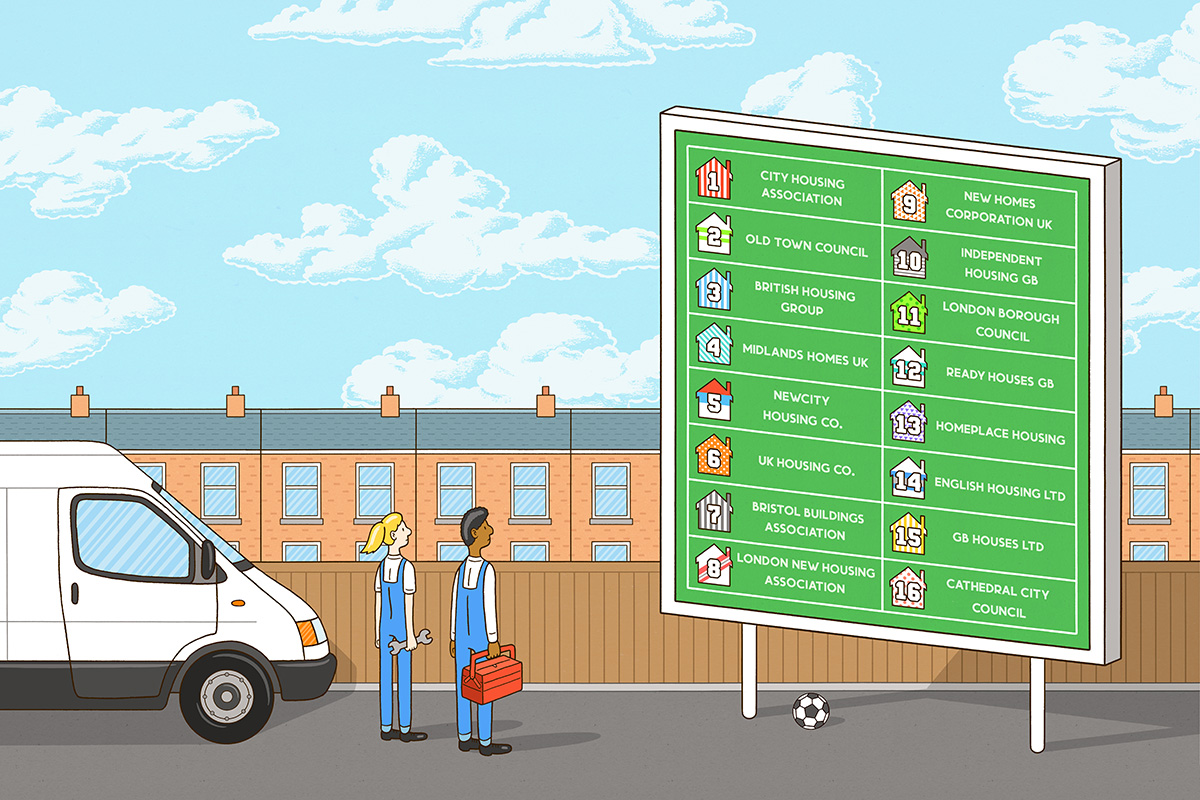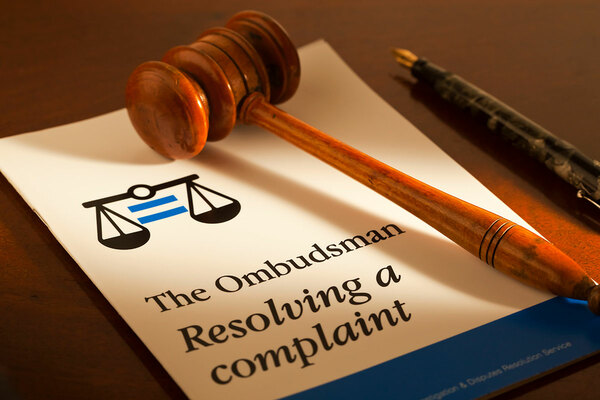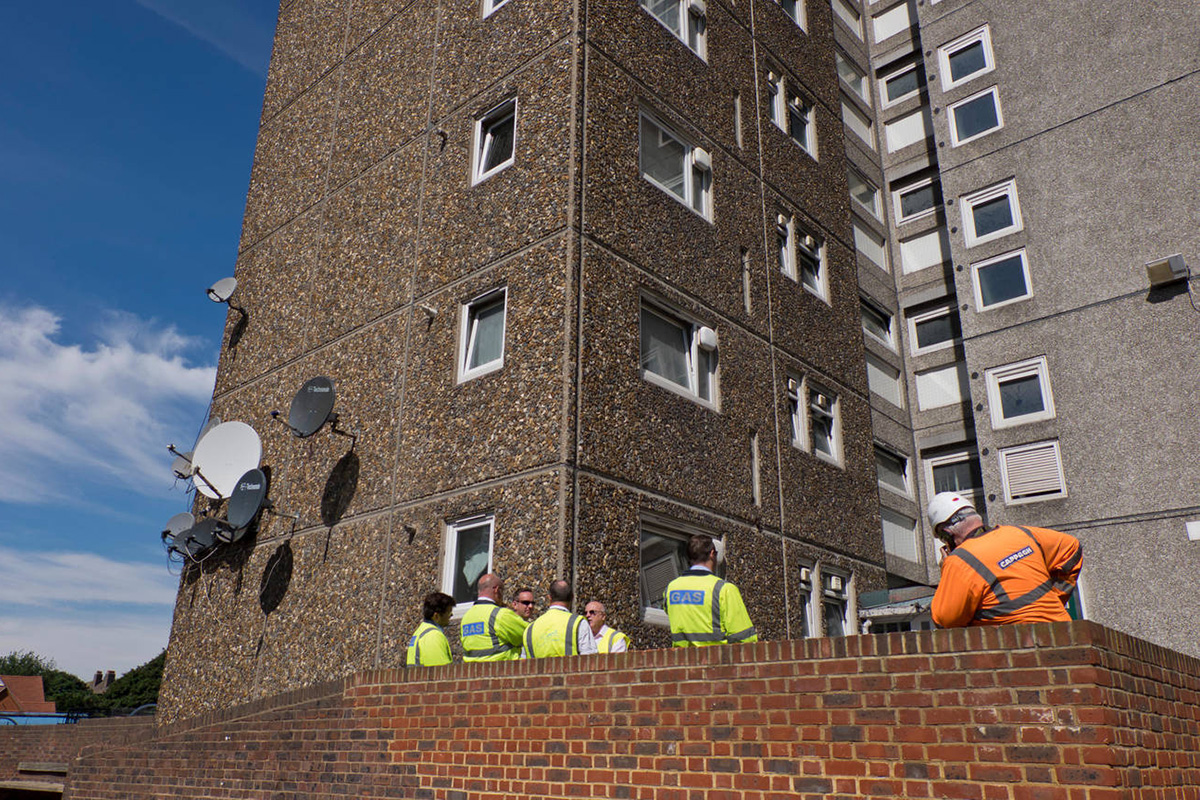You are viewing 1 of your 1 free articles
The complaints failures index: how does your organisation rank?
Inside Housing unveils a groundbreaking index of determinations by the Housing Ombudsman. Nathaniel Barker considers what it can tell us about the sector. Illustration by Phil Hackett
Everyone gets it wrong sometimes. Mistakes happen, but when they happen consistently, that could be a sign of an issue that needs resolving.
In the continuing aftermath of Grenfell, the spotlight remains on how important it is that residents’ concerns are taken seriously by social landlords, whether they relate to fire safety, repairs or other aspects of housing provision.
For the first time, Inside Housing introduces a groundbreaking piece of research into one key measure of mistakes by social landlords: the number of times they are each found lacking by the Housing Ombudsman, the sector’s complaints arbitration service.
Through extensive analysis of data obtained from the ombudsman, we have developed a first-of-its-kind ‘complaints failures index’ for the social housing sector. It shows how often each landlord has been declared at fault by the ombudsman relative to the size of its housing stock (see tables).
Using the Freedom of Information Act (FOIA), we have gathered information about every single determination issued by the Housing Ombudsman in the financial years 2017/18, 2018/19 and 2019/20 – which is a total of 2,968 conclusions from investigations by the service.
We have totted up the number of findings for each landlord, divided into the three categories used by the ombudsman: reasonable redress, partial maladministration and full maladministration.
This data has been consolidated so that ALMOs fall under the name of their parent council and all a housing association’s subsidiaries fall under the group heading, including organisations which have merged during the period covered.
Then we combined the findings to produce a single figure: the number of times that landlord was found at fault. Reasonable redress – which indicates where the ombudsman found evidence of service failure but that the landlord has acknowledged its mistake and put things right – has not been included, as these cases are regarded as a different kind of outcome by the ombudsman.
On its own, the ‘times at fault’ figure is not particularly illuminating. With 129, Clarion has the most – but as the largest social landlord in the country, that is exactly what you’d expect. Therefore we have divided the number of times at fault for each housing provider by the number of homes it owns – producing a figure which shows how frequently the organisation is criticised by the ombudsman relative to its size.
For housing associations, this stock size data has been taken from the Regulator of Social Housing’s (RSH) 2019 Statistical Data Return, combining the number of rented units owned with the number of leasehold units owned. We have excluded figures for homes managed but not owned by the landlord to avoid double counting the same homes in the sector – which may mean that some providers’ stock sizes seem surprisingly small.
For councils, data for stock sizes including both tenanted and leasehold homes is not readily available in the public domain, so we have obtained this through FOIAs. Forty-one councils have not responded to the request and so have not been included in the table.
Finally, we have multiplied that number (times at fault divided by stock size) by 1,000, in order to create a useable complaints failures index. The higher the index, the more often a landlord was found at fault across the three years relative to its stock size. A social landlord with 10,000 homes found at fault 10 times would get a score of 1.000. If it had been found at fault five times it would score 0.500, and if it were found at fault 20 times it would score 2.000.
An index has been calculated for 289 housing providers. Note that landlords which did not receive any determinations during the period covered have not been included. We have filtered out landlords with fewer than 1,000 homes to avoid the top of the list being dominated by very small landlords with one determination against them.
So, to summarise, the formula is as follows: ((partial maladministration findings + full maladministration findings) ÷ number of homes) × 1,000.
League tables are controversial. In the 2018 Social Housing Green Paper, the government proposed introducing sector league tables based on key performance indicators (KPIs) such as repairs, neighbourhood management and (possibly) complaints.
More than two years on, we are still awaiting the accompanying Social Housing White Paper which will set out more concrete policy proposals. But Inside Housing revealed last year that league tables are unlikely to see the light of day after having proved unpopular with landlords and tenants alike, with entrenchment of stigma a prominent concern.
So why have we decided to carry out this research – and why now?
Housing ombudsman Richard Blakeway is keen to publish landlord performance reports (picture: Simon Brandon)
The first thing to mention here is that – unlike what ministers proposed in the green paper – this is a very specific kind of table. It would quite be wrong to interpret the data as a ranking of social landlords in order from worst to best. Nevertheless, it is clear that complaints handling, particularly where the ombudsman has found evidence of maladministration, does speak to an important aspect of a landlord’s performance which matters to residents.
“The table itself is a measure that lacks subtlety; what you can’t tell from a table is if five incidents were five minor injuries or five heart transplants,” explains Jon Slade, director at consultancy Campbell Tickell.
“But what it does tell on each occasion is a story of the landlord not getting to grips with the issue and resolving it satisfactorily before the ombudsman got involved. An adverse finding by the ombudsman has got two things going on: first, a service failure of some kind, and second a failure to resolve that through the complaints process.
“Each finding is a difficulty in hearing the resident’s voice – and the question is when does a pattern become a problem? If you’ve got a large number of these, you should as an organisation be saying, ‘What’s going on here?’”
Tables or not, the RSH has been clear that it expects greater emphasis on consumer issues – including through the use of KPIs – to be central in the upcoming white paper.
For its part, the Housing Ombudsman has made no secret of its intention to publish far more information by the end of 2020, naming providers in its determinations and producing annual complaints performance reports for all 2,500 landlords in its scheme.
Housing ombudsman Richard Blakeway says he is keen for these reports to include “benchmarking of performance against size and type of landlord”.
This could lead to much closer regulatory scrutiny over how complaints are dealt with. Over the three years covered by our table, the ombudsman did not refer a single landlord to the RSH for service failure (although it referred one, Metropolitan Thames Valley, for non-compliance with an order).
A new memorandum of understanding will now see the ombudsman contact the RSH whenever an investigation uncovers serious, potentially systemic issues at a housing provider. Mr Blakeway says there “is an increased likelihood that the ombudsman will refer cases to the regulator” in the coming years.
Incidentally, the ombudsman issued three findings of “severe maladministration” in the period covered, all in summer 2019, against Camden Council, Cottsway and Torus. They are in the table at 21, 98 and 161 respectively.
In short, social landlords will want to get their house in order now, and this table represents a benchmark to support that.
Darren Hartley, chief executive of tenants’ charity Taroe Trust, says the incoming changes should “drive home the importance of delivering high-quality services” and “act as a big wake-up call for boards”.
Of course, all this has not come out of a blue sky, but rather the horrors at Grenfell Tower on 14 June 2017. Remember that nearly all the determinations counted up in the table have been issued since the fire although some initial complaints will date from before then). Three years on, it remains vital to listen when residents say something is wrong.
“The knowledge that such adverse findings from the ombudsman will be placed in the public domain should itself drive home the importance of delivering high-quality services to tenants. It should act as a big wake-up call for boards and assist them to hold their executive to account,” says Darren Hartley, chief executive of tenants’ charity Taroe Trust.
And then there is coronavirus, which has up-ended the old ways of doing things and reinforced the importance of a good home (and landlord) like never before. Amid the pandemic, many social housing providers are planning to reform their services, and if COVID-19 has taught us anything, it must be that putting things right when they go wrong takes a concerted effort.
The table is a useful tool for considering why some organisations are finding themselves at the wrong end of the ombudsman’s decisions relatively frequently – but there are one or two things to remember.
As mentioned above, it would be overly simplistic to presume that landlords with the highest index provide the worst customer service. Mr Hartley says his team “routinely hears” about providers elongating their complaints process, increasing the chance that residents will give up before contacting the ombudsman, or simply failing to fulfil the requirement to inform residents of their right to do so.
“Therefore it’s likely that a landlord that promotes the right to go to the ombudsman is also more likely to have a proportionately higher number of adverse findings compared with another landlord that fails to promote the right to go to the ombudsman at all,” he says. Mr Blakeway acknowledges that these concerns are “really valid”.
Southwark Council has faced challenges at the Ledbury Estate, although it has not been confirmed that any ombudsman determinations directly relate to the blocks (picture: Alamy)
One housing association chief executive told Inside Housing that she would be “most worried about those landlords where no cases get to the Housing Ombudsman”. There are a very small number of providers with more than 10,000 homes which were not subject to any ombudsman determinations during the period covered.
However, the index certainly tells a story. Immediately striking is the prevalence of London landlords with the highest scores – all of the top nine operate in the capital. Theories on this phenomenon relate to stock profile, with generally older social housing in London, as well as resident demographics, with greater proportions of leaseholders and denser populations for instance. Mr Slade posits that it “perhaps suggests that services are under more stress” in London due to greater operating pressures.
Among the 13 associations in the top 20, eight have faced regulatory downgrades for governance by the RSH at some point since 2016. Another, Notting Hill Genesis, admitted in 2019 that there were issues with its repairs operation in some areas.
Turning to the seven councils, Brent shut down its ALMO, Brent Housing Partnership, in 2017 after service failures saw tenant satisfaction drop to just 56%. Lambeth Council was declared to have breached the regulator’s Home Standard over health and safety issues in November 2019. Two more – Hammersmith & Fulham and Southwark – have been battling with highly complex asset management challenges at tower blocks built using Ronan Point-style large-panel system construction.
It should be mentioned that by dint of extreme budget cuts and stretched, far-reaching services, councils “are definitely facing more difficult operating environments” than housing associations, according to Mr Slade.
The two have been included side by side because they are both subject to the same ombudsman scheme and the same regulatory consumer standards, but most importantly because the distinction should be immaterial from a resident’s perspective.
The mean index score for councils in our table is 0.517, which is only marginally higher than housing associations at 0.508.
Size is another intriguing aspect. The landlords near the top of our table vary from being pretty little to rather large, with no obvious trend in favour of one or the other. “It’s hard to generalise in terms of size and type of landlord,” says Mr Blakeway. “Fundamentally it comes down to when something has gone wrong how has that landlord responded and illustrated learning to the resident and to us and to the board.”
This perhaps busts the common myth that the bigger a social housing provider becomes, the less it takes an interest in residents’ concerns. In fact, if we were to include landlords with fewer than 1,000 homes, the top of the table would be dominated by very small organisations, including eight housing co-operatives and several community-based associations.
Determinations by Housing Ombudsman 2017/18 to 2019/20
| Provider | Redress | Partial maladministration | Maladministration | Times at fault | Number of homes | Index | Notes |
| Gateway Housing Association | 1 | 4 | 5 | 9 | 2,891 | 3.113 | |
| Shepherds Bush Housing Group | 1 | 2 | 12 | 14 | 4,727 | 2.962 | |
| Hammersmith and Fulham Council | 10 | 9 | 32 | 41 | 17,126 | 2.394 | |
| One Housing | 10 | 8 | 28 | 36 | 15,242 | 2.362 | |
| A2Dominion | 8 | 19 | 47 | 66 | 33,246 | 1.985 | |
| Brent Council | 8 | 2 | 19 | 21 | 11,509 | 1.825 | closed ALMO |
| Newlon Housing Trust | 3 | 6 | 8 | 14 | 7,722 | 1.813 | |
| Wandle Housing Association | 2 | 6 | 7 | 13 | 7,509 | 1.731 | |
| Origin Housing | 2 | 4 | 7 | 11 | 6,556 | 1.678 | |
| St Albans City and District Council | 3 | 0 | 8 | 8 | 4,898 | 1.633 | |
| Adur District Council | 0 | 2 | 3 | 5 | 3,136 | 1.594 | |
| Unity Housing Association | 0 | 0 | 2 | 2 | 1,287 | 1.554 | |
| Inquilab Housing Association | 0 | 0 | 2 | 2 | 1,298 | 1.541 | |
| Lambeth Council | 11 | 7 | 44 | 51 | 33,347 | 1.529 | |
| Triathlon Homes | 1 | 0 | 2 | 2 | 1,379 | 1.450 | JV between L&Q, Southern and First Base |
| Redbridge Council | 1 | 1 | 9 | 10 | 6,930 | 1.443 | |
| Southwark Council | 10 | 14 | 61 | 75 | 55,000 | 1.364 | |
| Paragon Asra Housing | 10 | 7 | 22 | 29 | 22,176 | 1.308 | merged during period |
| Islington and Shoreditch Housing Association | 0 | 2 | 1 | 3 | 2,426 | 1.237 | |
| Notting Hill Genesis | 23 | 25 | 49 | 74 | 60,530 | 1.223 | merged during period |
| Camden Council | 6 | 7 | 32 | 39 | 32,247 | 1.209 | severe maladministration |
| Peabody Trust | 53 | 16 | 52 | 68 | 56,303 | 1.208 | merged during period |
| Hyde Housing | 21 | 11 | 38 | 49 | 41,602 | 1.178 | |
| Harrow Council | 0 | 3 | 4 | 7 | 6,052 | 1.157 | |
| Haringey Council | 4 | 4 | 19 | 23 | 20,057 | 1.147 | ALMO |
| Octavia Housing | 2 | 4 | 2 | 6 | 5,379 | 1.115 | |
| Guinness Partnership | 22 | 14 | 54 | 68 | 63,331 | 1.074 | |
| Clarion Housing Group | 31 | 29 | 100 | 129 | 120,154 | 1.074 | |
| Hackney Council | 3 | 10 | 24 | 34 | 32,000 | 1.063 | |
| Fareham Borough Council | 0 | 1 | 2 | 3 | 2,863 | 1.048 | |
| Orbit Group | 11 | 11 | 32 | 43 | 41,787 | 1.029 | |
| Waltham Forest Council | 5 | 3 | 9 | 12 | 11,951 | 1.004 | closed ALMO |
| Home Group | 10 | 14 | 38 | 52 | 51,882 | 1.002 | |
| Islington Council | 8 | 13 | 21 | 34 | 34,144 | 0.996 | |
| Stroud District Council | 1 | 1 | 4 | 5 | 5,204 | 0.961 | |
| Women's Pioneer Housing | 2 | 0 | 1 | 1 | 1,078 | 0.928 | |
| Westminster City Council | 8 | 5 | 14 | 19 | 20,824 | 0.912 | closed ALMO |
| Curo Group | 3 | 5 | 7 | 12 | 13,255 | 0.905 | |
| Hillingdon Council | 0 | 5 | 7 | 12 | 13,334 | 0.900 | |
| Tower Hamlets Council | 6 | 7 | 12 | 19 | 21,193 | 0.897 | ALMO |
| Longhurst Group | 9 | 6 | 14 | 20 | 22,746 | 0.879 | |
| L&Q | 24 | 20 | 56 | 76 | 86,678 | 0.877 | merged during period |
| St Mungo Community Housing Association | 0 | 0 | 1 | 1 | 1,169 | 0.855 | |
| Southern Housing Group | 19 | 3 | 21 | 24 | 28,724 | 0.836 | merged during period |
| Kensington and Chelsea Council | 0 | 3 | 5 | 8 | 9,592 | 0.834 | closed ALMO |
| Enfield Council | 4 | 1 | 12 | 13 | 15,623 | 0.832 | |
| Nehemiah United Churches Housing Association | 0 | 1 | 0 | 1 | 1,213 | 0.824 | |
| Sutton Council | 0 | 3 | 3 | 6 | 7,429 | 0.808 | ALMO |
| Worthing Homes | 0 | 2 | 1 | 3 | 3,738 | 0.803 | |
| Kingston upon Thames Council | 0 | 2 | 3 | 5 | 6,436 | 0.777 | |
| Watford Community Housing Trust | 0 | 1 | 3 | 4 | 5,203 | 0.769 | |
| Birmingham City Council | 3 | 15 | 35 | 50 | 66,009 | 0.757 | |
| Harrogate Borough Council | 0 | 2 | 1 | 3 | 3,972 | 0.755 | |
| Catalyst Housing Group | 9 | 6 | 17 | 23 | 30,722 | 0.749 | merged during period |
| Darlington Borough Council | 0 | 0 | 4 | 4 | 5,412 | 0.739 | |
| Barking and Dagenham Council | 4 | 3 | 12 | 15 | 20,387 | 0.736 | |
| North West Leicestershire District Council | 0 | 0 | 3 | 3 | 4,238 | 0.708 | |
| Stonewater | 2 | 8 | 14 | 22 | 31,138 | 0.707 | |
| Croydon Churches Housing Association | 0 | 0 | 1 | 1 | 1,444 | 0.693 | |
| Brunelcare | 0 | 0 | 1 | 1 | 1,448 | 0.691 | |
| Haig Housing Trust | 0 | 0 | 1 | 1 | 1,500 | 0.667 | |
| Mount Green Housing Association | 0 | 0 | 1 | 1 | 1,509 | 0.663 | |
| Metropolitan Thames Valley Housing | 13 | 6 | 27 | 33 | 51,916 | 0.636 | merged during period |
| East Midlands Housing Group | 4 | 4 | 7 | 11 | 17,636 | 0.624 | |
| Connect Housing | 0 | 0 | 2 | 2 | 3,257 | 0.614 | |
| York City Council | 1 | 2 | 3 | 5 | 8,143 | 0.614 | |
| Moat | 4 | 2 | 9 | 11 | 17,977 | 0.612 | |
| Habinteg Housing Association | 0 | 1 | 1 | 2 | 3,283 | 0.609 | |
| Greenwich Council | 3 | 4 | 11 | 15 | 25,221 | 0.595 | |
| Optivo | 7 | 10 | 15 | 25 | 43,753 | 0.571 | merged during period |
| Heylo Housing | 0 | 1 | 0 | 1 | 1,753 | 0.570 | |
| Hounslow Council | 1 | 0 | 9 | 9 | 15,813 | 0.569 | ALMO |
| Halton Housing Trust | 0 | 0 | 4 | 4 | 7,175 | 0.557 | |
| One Manchester | 0 | 3 | 4 | 7 | 12,695 | 0.551 | |
| Havering Council | 2 | 2 | 4 | 6 | 11,353 | 0.528 | |
| Arun District Council | 2 | 1 | 1 | 2 | 3,801 | 0.526 | |
| Exeter City Council | 0 | 1 | 2 | 3 | 5,754 | 0.521 | |
| Wiltshire Council | 1 | 1 | 2 | 3 | 5,787 | 0.518 | |
| Your Housing Group | 2 | 7 | 7 | 14 | 27,744 | 0.505 | |
| Central and Cecil Housing Trust | 0 | 1 | 0 | 1 | 1,983 | 0.504 | |
| Croydon Council | 1 | 2 | 6 | 8 | 15,929 | 0.502 | |
| Lancaster City Council | 0 | 1 | 1 | 2 | 3,984 | 0.502 | |
| Futures Housing Group | 2 | 3 | 2 | 5 | 9,961 | 0.502 | |
| Sedgemoor District Council | 0 | 2 | 0 | 2 | 4,057 | 0.493 | ALMO |
| Midland Heart | 8 | 3 | 13 | 16 | 32,659 | 0.490 | |
| Nuneaton and Bedworth Borough Council | 0 | 1 | 2 | 3 | 6,157 | 0.487 | |
| Oldham Metropolitan Borough Council | 0 | 0 | 1 | 1 | 2,072 | 0.483 | |
| Hightown Housing Association | 1 | 0 | 3 | 3 | 6,294 | 0.477 | |
| Sanctuary Housing | 26 | 15 | 22 | 37 | 78,069 | 0.474 | |
| Barnet Council | 3 | 1 | 5 | 6 | 12,772 | 0.470 | ALMO |
| One Vision Housing | 3 | 2 | 4 | 6 | 13,235 | 0.453 | |
| Saxon Weald Homes | 1 | 0 | 3 | 3 | 6,635 | 0.452 | |
| Housing 21 | 3 | 1 | 7 | 8 | 18,270 | 0.438 | |
| Poplar HARCA | 1 | 2 | 2 | 4 | 9,284 | 0.431 | |
| Stockport Council | 1 | 1 | 4 | 5 | 11,976 | 0.418 | ALMO |
| Brighton and Hove City Council | 2 | 2 | 4 | 6 | 14,441 | 0.415 | |
| West Kent Housing Association | 0 | 2 | 1 | 3 | 7,340 | 0.409 | |
| Cottsway Housing Association | 0 | 0 | 2 | 2 | 4,961 | 0.403 | severe maladministration |
| Sandwell Metropolitan Borough Council | 1 | 4 | 8 | 12 | 29,840 | 0.402 | |
| Cheltenham Borough Council | 0 | 1 | 1 | 2 | 5,010 | 0.399 | ALMO |
| Onward Group | 5 | 1 | 11 | 12 | 30,238 | 0.397 | restructured during period |
| Reside Housing Association | 0 | 0 | 1 | 1 | 2,543 | 0.393 | |
| Blackpool Council | 0 | 0 | 2 | 2 | 5,087 | 0.393 | ALMO |
| Joseph Rowntree Housing Trust | 1 | 1 | 0 | 1 | 2,600 | 0.385 | |
| Corby Borough Council | 0 | 1 | 1 | 2 | 5,291 | 0.378 | |
| Plymouth Community Homes | 0 | 3 | 3 | 6 | 15,955 | 0.376 | |
| Pioneer Housing and Community Group | 0 | 1 | 0 | 1 | 2,687 | 0.372 | |
| Wolverhampton City Council | 1 | 2 | 7 | 9 | 24,234 | 0.371 | ALMO |
| Extracare Charitable Trust | 0 | 0 | 1 | 1 | 2,714 | 0.368 | |
| Ealing Council | 4 | 1 | 5 | 6 | 16,525 | 0.363 | |
| Citizen Housing Group | 3 | 4 | 7 | 11 | 30,330 | 0.363 | restructured during period |
| Jigsaw Homes Group | 4 | 4 | 8 | 12 | 33,123 | 0.362 | merged during period |
| Vale of Aylesbury Housing Trust | 0 | 1 | 2 | 3 | 8,283 | 0.362 | |
| North Warwickshire Borough Council | 0 | 0 | 1 | 1 | 2,763 | 0.362 | |
| Places for People Group | 8 | 5 | 20 | 25 | 69,239 | 0.361 | merged during period |
| Wokingham Borough Council | 0 | 0 | 1 | 1 | 2,784 | 0.359 | |
| Oxford City Council | 1 | 2 | 1 | 3 | 8,371 | 0.358 | |
| City of London Corporation | 0 | 0 | 1 | 1 | 2,824 | 0.354 | |
| Riverside Group | 8 | 7 | 11 | 18 | 51,005 | 0.353 | |
| Bristol City Council | 0 | 1 | 9 | 10 | 28,463 | 0.351 | |
| Central Bedfordshire Council | 1 | 0 | 2 | 2 | 5,719 | 0.350 | |
| Grand Union Housing Group | 1 | 1 | 3 | 4 | 11,596 | 0.345 | |
| Uttlesford District Council | 0 | 0 | 1 | 1 | 2,952 | 0.339 | |
| Platform Housing Group | 6 | 5 | 10 | 15 | 44,292 | 0.339 | merged during period |
| Dacorum Borough Council | 1 | 0 | 4 | 4 | 11,929 | 0.335 | |
| Bolton at Home | 2 | 1 | 5 | 6 | 17,912 | 0.335 | |
| Housing Plus | 1 | 3 | 1 | 4 | 12,194 | 0.328 | merged during period |
| Aspire Housing | 1 | 2 | 1 | 3 | 9,270 | 0.324 | |
| Southway Housing Trust | 1 | 1 | 1 | 2 | 6,201 | 0.323 | |
| Tower Hamlets Community Housing | 0 | 0 | 1 | 1 | 3,105 | 0.322 | |
| Accord Housing Association | 4 | 3 | 1 | 4 | 12,578 | 0.318 | |
| Wealden District Council | 0 | 0 | 1 | 1 | 3,146 | 0.318 | |
| Leeds City Council | 12 | 8 | 10 | 18 | 57,070 | 0.315 | |
| Flagship Housing Group | 1 | 1 | 9 | 10 | 32,068 | 0.312 | merged during period |
| Crawley Borough Council | 0 | 1 | 2 | 3 | 9,668 | 0.310 | |
| Medway Council | 0 | 0 | 1 | 1 | 3,232 | 0.309 | |
| Rochdale Boroughwide Housing | 0 | 1 | 3 | 4 | 13,457 | 0.297 | |
| North Devon Homes | 0 | 1 | 0 | 1 | 3,378 | 0.296 | |
| Welwyn Hatfield Borough Council | 1 | 0 | 3 | 3 | 10,183 | 0.295 | |
| South Lakes Housing | 0 | 0 | 1 | 1 | 3,425 | 0.292 | |
| Alliance Homes | 0 | 1 | 1 | 2 | 6,924 | 0.289 | |
| Babergh District Council | 0 | 0 | 1 | 1 | 3,519 | 0.284 | |
| Connexus Housing | 2 | 1 | 2 | 3 | 10,643 | 0.282 | merged during period |
| Leicester City Council | 0 | 0 | 6 | 6 | 21,561 | 0.278 | |
| Great Places Housing Group | 1 | 3 | 3 | 6 | 21,746 | 0.276 | stock figure for Equity plus Great Places from 2019 SDR |
| ForHousing | 3 | 1 | 4 | 5 | 18,174 | 0.275 | restructured during period |
| Hastoe Housing Association | 0 | 1 | 1 | 2 | 7,306 | 0.274 | |
| Folkestone & Hythe District Council | 0 | 0 | 1 | 1 | 3,686 | 0.271 | ALMO |
| Epping Forest District Council | 0 | 1 | 1 | 2 | 7,456 | 0.268 | |
| Barnsley Council | 0 | 1 | 4 | 5 | 18,674 | 0.268 | ALMO |
| South Liverpool Homes | 0 | 0 | 1 | 1 | 3,749 | 0.267 | |
| North Kesteven District Council | 0 | 0 | 1 | 1 | 3,880 | 0.258 | |
| Salvation Army Housing Association | 0 | 1 | 0 | 1 | 3,968 | 0.252 | |
| Anchor Hanover Group | 0 | 6 | 7 | 13 | 51,637 | 0.252 | merged during period |
| First Choice Homes Oldham | 1 | 1 | 2 | 3 | 11,999 | 0.250 | |
| Network Homes | 7 | 4 | 1 | 5 | 20,211 | 0.247 | |
| Together Housing | 0 | 5 | 4 | 9 | 37,633 | 0.239 | |
| Yorkshire Housing | 1 | 1 | 3 | 4 | 16,942 | 0.236 | |
| Livin Housing | 1 | 2 | 0 | 2 | 8,476 | 0.236 | |
| Bournville Village Trust | 0 | 0 | 1 | 1 | 4,274 | 0.234 | |
| Torus | 3 | 6 | 3 | 9 | 38,498 | 0.234 | severe maladministration; merged during period |
| South Tyneside Council | 0 | 1 | 3 | 4 | 17,270 | 0.232 | ALMO |
| Regenda | 0 | 0 | 3 | 3 | 12,968 | 0.231 | |
| Estuary Housing Association | 0 | 0 | 1 | 1 | 4,443 | 0.225 | |
| Norwich City Council | 0 | 3 | 1 | 4 | 17,785 | 0.225 | |
| East Suffolk Council | 0 | 1 | 0 | 1 | 4,456 | 0.224 | |
| MHS Homes | 1 | 0 | 2 | 2 | 9,058 | 0.221 | not registered with RSH |
| Incommunities Group | 0 | 2 | 3 | 5 | 22,818 | 0.219 | |
| Eastbourne Borough Council | 1 | 0 | 1 | 1 | 4,675 | 0.214 | |
| Settle Group | 1 | 1 | 1 | 2 | 9,384 | 0.213 | |
| Ocean Housing Group | 1 | 1 | 0 | 1 | 4,728 | 0.212 | |
| Dover District Council | 0 | 1 | 0 | 1 | 4,762 | 0.210 | ALMO closing down |
| Thrive Homes | 0 | 1 | 0 | 1 | 4,769 | 0.210 | |
| Johnnie Johnson Housing Trust | 0 | 0 | 1 | 1 | 4,869 | 0.205 | |
| Accent Group | 3 | 2 | 2 | 4 | 19,958 | 0.200 | |
| Broadland Housing Association | 0 | 0 | 1 | 1 | 5,040 | 0.198 | |
| Vivid | 3 | 1 | 5 | 6 | 30,289 | 0.198 | merged during period |
| Beyond Housing | 0 | 1 | 2 | 3 | 15,185 | 0.198 | merged during period |
| Aster Group | 3 | 1 | 5 | 6 | 30,506 | 0.197 | |
| Bolsover District Council | 0 | 0 | 1 | 1 | 5,156 | 0.194 | |
| Swindon Borough Council | 0 | 0 | 2 | 2 | 10,760 | 0.186 | |
| Wandsworth Council | 1 | 2 | 4 | 6 | 32,617 | 0.184 | |
| Winchester City Council | 1 | 1 | 0 | 1 | 5,453 | 0.183 | |
| Canterbury City Council | 0 | 0 | 1 | 1 | 5,500 | 0.182 | ALMO |
| Solihull Metropolitan Borough Council | 0 | 1 | 1 | 2 | 11,136 | 0.180 | ALMO |
| Thirteen Housing Group | 1 | 3 | 3 | 6 | 33,707 | 0.178 | |
| Dudley Metropolitan Borough Council | 1 | 1 | 3 | 4 | 22,577 | 0.177 | |
| Cheshire Peaks & Plains Housing Trust | 0 | 0 | 1 | 1 | 5,656 | 0.177 | |
| South Cambridgeshire District Council | 0 | 0 | 1 | 1 | 5,672 | 0.176 | |
| Great Yarmouth Borough Council | 0 | 0 | 1 | 1 | 5,764 | 0.173 | |
| East Kent Housing | 2 | 0 | 3 | 3 | 17,371 | 0.173 | ALMO for Dover, Canterbury, Thanet and Folkestone & Hythe set for closure |
| Cheshire West and Chester Council | 0 | 1 | 0 | 1 | 5,798 | 0.172 | |
| Cobalt Housing | 0 | 0 | 1 | 1 | 5,942 | 0.168 | |
| GreenSquare Group | 0 | 2 | 0 | 2 | 12,034 | 0.166 | |
| Northampton Borough Council | 0 | 1 | 1 | 2 | 12,334 | 0.162 | ALMO |
| Cross Keys Homes | 1 | 2 | 0 | 2 | 12,400 | 0.161 | |
| Phoenix Community Housing Association | 0 | 0 | 1 | 1 | 6,252 | 0.160 | |
| Magenta Living | 0 | 2 | 0 | 2 | 12,665 | 0.158 | |
| Saffron Housing Trust | 0 | 1 | 0 | 1 | 6,336 | 0.158 | |
| Red Kite Community Housing | 1 | 1 | 1 | 6,439 | 0.155 | ||
| Southend-on-Sea Borough Council | 0 | 0 | 1 | 1 | 6,641 | 0.151 | ALMO |
| Raven Housing Trust | 0 | 0 | 1 | 1 | 6,689 | 0.149 | |
| Freebridge Community Housing | 1 | 0 | 1 | 1 | 6,822 | 0.147 | |
| Plus Dane Housing Group | 0 | 0 | 2 | 2 | 13,658 | 0.146 | |
| Walsall Housing Group | 0 | 1 | 2 | 3 | 21,065 | 0.142 | |
| LiveWest Homes | 3 | 1 | 4 | 5 | 35,310 | 0.142 | merged during period |
| Wythenshawe Community Housing Group | 0 | 2 | 0 | 2 | 14,248 | 0.140 | |
| Paradigm Housing Group | 3 | 1 | 1 | 2 | 14,280 | 0.140 | |
| Bernicia Group | 2 | 0 | 2 | 2 | 14,524 | 0.138 | |
| Wigan Metropolitan Borough Council | 0 | 0 | 3 | 3 | 22,091 | 0.136 | closed ALMO |
| Golding Homes | 1 | 1 | 0 | 1 | 7,705 | 0.130 | |
| Manchester City Council | 0 | 0 | 2 | 2 | 16,098 | 0.124 | Council proposed closing ALMO |
| Sovereign Housing Association | 3 | 3 | 4 | 7 | 57,109 | 0.123 | merged during period |
| Ipswich Borough Council | 0 | 0 | 1 | 1 | 8,248 | 0.121 | |
| Newcastle City Council | 0 | 1 | 2 | 3 | 25,212 | 0.119 | ALMO |
| Bromford Housing Group | 3 | 1 | 4 | 5 | 42,529 | 0.118 | merged during period |
| Luton Borough Council | 0 | 0 | 1 | 1 | 8,512 | 0.117 | |
| Southampton City Council | 0 | 0 | 2 | 2 | 17,735 | 0.113 | |
| Richmond Housing Partnership | 0 | 0 | 1 | 1 | 9,372 | 0.107 | |
| Swan Housing Association | 1 | 1 | 0 | 1 | 9,586 | 0.104 | |
| Gateshead Metropolitan Borough Council | 1 | 1 | 1 | 2 | 19,870 | 0.101 | Council proposed closing ALMO |
| Doncaster Metropolitan Borough Council | 0 | 0 | 2 | 2 | 20,419 | 0.098 | ALMO |
| Cornwall Council | 1 | 1 | 0 | 1 | 10,681 | 0.094 | ALMO |
| Bournemouth Christchurch and Poole Council | 0 | 0 | 1 | 1 | 10,782 | 0.093 | part ALMO; merged during period |
| Eastlight Community Homes | 0 | 1 | 0 | 1 | 11,406 | 0.088 | merged during period |
| Kirklees Council | 0 | 1 | 1 | 2 | 23,292 | 0.086 | ALMO |
| Harlow District Council | 2 | 0 | 1 | 1 | 12,238 | 0.082 | |
| Lincoln Housing Partnership | 1 | 1 | 0 | 1 | 12,621 | 0.079 | merged during period |
| Derby City Council | 0 | 0 | 1 | 1 | 13,455 | 0.074 | |
| Livv Housing Group | 0 | 0 | 1 | 1 | 13,624 | 0.073 | restructured during period |
| Radian Group | 1 | 0 | 2 | 2 | 31,819 | 0.063 | merged during period |
| BPHA | 2 | 0 | 1 | 1 | 17,786 | 0.056 | |
| Believe Housing | 0 | 1 | 0 | 1 | 18,196 | 0.055 | |
| Karbon Homes | 0 | 0 | 1 | 1 | 26,723 | 0.037 | |
| Wakefield and District Housing | 2 | 1 | 0 | 1 | 31,432 | 0.032 | |
| CHP | 1 | 0 | 0 | 0 | 9,917 | 0.000 | |
| Irwell Valley Homes | 1 | 0 | 0 | 0 | 7,538 | 0.000 | |
| Leeds and Yorkshire Housing Association | 1 | 0 | 0 | 0 | 1,516 | 0.000 | |
| Salix Homes | 2 | 0 | 0 | 0 | 8,425 | 0.000 | |
| Arawak Walton Housing Association | 1 | 0 | 0 | 0 | 1,071 | 0.000 | |
| Broadacres Housing Association | 1 | 0 | 0 | 0 | 6,393 | 0.000 | |
| Colchester Borough Council | 2 | 0 | 0 | 0 | 6,915 | 0.000 | ALMO |
| East End Homes | 3 | 0 | 0 | 0 | 3,786 | 0.000 | |
| EPIC - Empowering People Inspiring Communities | 1 | 0 | 0 | 0 | 1,194 | 0.000 | |
| Leeds Federated Housing Association | 1 | 0 | 0 | 0 | 4,239 | 0.000 | |
| Magna Housing | 1 | 0 | 0 | 0 | 8,879 | 0.000 | |
| Selwood Housing Society | 1 | 0 | 0 | 0 | 6,560 | 0.000 | |
| Silva Homes | 1 | 0 | 0 | 0 | 7,585 | 0.000 | merged during period |
| Tamworth Borough Council | 1 | 0 | 0 | 0 | 4,648 | 0.000 | |
| Trident Housing Association | 2 | 0 | 0 | 0 | 3,274 | 0.000 | |
| Waverley Borough Council | 4 | 0 | 0 | 0 | 5,243 | 0.000 | |
| Westward Housing Group | 1 | 0 | 0 | 0 | 7,533 | 0.000 |
Redwood Housing Co-op, located in Oxo Tower Wharf in London’s South Bank, was issued with two ‘maladministration’ findings in 2019/20 despite owning just 78 homes. Shian Housing Association, a 496-home BME landlord, has an index score of 10.081, with five determinations against it in the period covered.
Leslie Laniyan, managing director at Shian, says that it uses a two-stage complaints process considered best practice by the ombudsman, adding: “Independent scrutiny of complaints which leads to an improvement in services is something Shian will always welcome.”
Redwood Housing Co-op did not respond when approached for comment.
“Smaller organisations simply have less resources to deal with situations where they drop the ball,” observes Mr Slade. “If the chief executive of a large housing association looks up from their desk, they’ve got much more in front of them: complaints teams, customer support, policy teams, business insight.”
Beyond the numbers, the underlying themes are important to consider.
“My view on all data is that it can indicate something to you, but you do need to look at what lies beneath some of the casework and some of the issues to think about how you get to a change in terms of the service,” says Mr Blakeway.
For example, of the 14 times Shepherds Bush Housing Group (SBHG) was found at fault by the ombudsman over the three years, 10 determinations came in 2019/20. SBHG was downgraded by the RSH in April 2020 after uncovering serious issues with electrical and asbestos safety checks.
Matt Campion, chief executive of SBHG, says: “The underlying issues which led to these results are already being addressed through our group-wide business transformation programme. We have, and continue to take, positive, practical action.”
From the data supplied by the ombudsman, we can see that six of the cases in this year fell into the ‘property condition’ category compared with none in the previous two years – perhaps indicating that the organisation was struggling to keep on top of asset management as it worked through wider safety concerns.
Similarly, Wandle, also recently hit with a governance downgrade, was issued with eight of its 13 negative determinations in the final year covered.
Two categories stand out: ‘tenants behaviour’ and ‘complaints handling’.
Direction of travel is significant too, and some landlords with high indexes have seen improvements. One Housing was found at fault 13 times in 2017/18 and 16 times in 2018/19, but only seven times in 2019/20.
Hilary Milne, group director of governance and compliance at One Housing, says a new resolution team aimed at resolving complaints earlier is “helping to mitigate the need for formal complaints and referrals to the Housing Ombudsman”.
Gateway, at the top of the table, says it is using ombudsman determinations to learn lessons and has “seen a reduction in the amount and types of enquiries and complaints to the ombudsman by over 50% in the 2019/20 year”.
Different landlords will doubtless receive this table in different ways. For Mr Slade: “The better organisations will say, ‘Anything like this we regard as gold dust – it can tell us something we need to put right.’ However, organisations with a weaker customer focus will start to dissemble and explain why the score is wrong or it doesn’t matter.”
“Ultimately, I believe the most important aspect of publishing data such as this is to increase accountability of landlords to tenants, leading to longer-term cultural improvements and commitments to improving services for tenants,” says Taroe’s Mr Hartley. “The publishing of such data needs to be seen within a broader shift in the sector that places consumer matters on an equal footing with economic concerns since they are two sides of the same coin.”
But, he adds, it must be part of “a broader shift in the sector that places consumer matters on an equal footing with economic concerns since they are two sides of the same coin”.
No index, table or data exercise can alone ensure that residents are heard by their landlords. But as social landlords continue to grapple with the aftermath of Grenfell while facing down the effects of COVID-19, it is vital that commitments to such a shift are not allowed to falter.
All organisations discussed have been contacted for comment.
Responses from social landlords
Spokesperson for Gateway Housing Association: “At Gateway, we know there are always lessons to be learned, and determinations from the Housing Ombudsman have been useful in this regard. Over the past three years we’ve worked closely with residents to improve processes and services, and we’ve seen a reduction in the amount and types of enquiries and complaints to the ombudsman by over 50% in the 2019/20 year.”
Matt Campion, chief executive of Shepherds Bush Housing Group: “Customer satisfaction is one of our most important business priorities and we are always disappointed when a resident feels they need to complain. The underlying issues which led to these results are already being addressed through our group-wide business transformation programme. We have, and continue to take, positive, practical action.
“We have reviewed our complaints policy and reallocated resources to address the issues that give rise to complaints. We are using lessons learned to feed into our improvement plans. We are doing this in partnership with our newly reformed resident scrutiny panel and with input from the Housing Ombudsman.
“We are now seeing the results from this positive action, with just five cases referred to the ombudsman this year. We support all forms of transparency and will be reporting on this in our tenant annual report.”
Hilary Milne, group director of governance and compliance at One Housing: “While our performance has improved year on year, we recognise how important it is to get things right for our customers and are continuing to work hard to improve how we deal with complaints. We have revised our existing process and introduced a resolution team to ensure we are resolving complaints at the earliest opportunity.
“We are already seeing that these changes are helping to mitigate the need for formal complaints and referrals to the Housing Ombudsman. Compared to these historic numbers, we have seen referrals to the ombudsman fall by more than 50%.”
Gary Blatcher, director of customer experience at A2Dominion: “We continually work to deliver the best service for our customers and have made major improvements from the period covered by this data, which goes back to early 2017. Since April of this year, our performance has improved by 37% compared to the results of this analysis. We have proactively worked with the Housing Ombudsman, improving our internal processes and using insight to invest in enhanced training for our customer-facing staff.”
Eleanor Southwood, cabinet member for housing and welfare reform at Brent Council: “We are committed to providing our tenants with the best possible service. It’s no secret that improvements were required and, having brought housing management in-house in 2017, we’ve been working hard to change things. We’re building a more responsive and flexible repairs service and satisfaction is improving. There’s lots more to do and we’re continuing to work with tenants to build an excellent service across the board.”
Spokesperson for Newlon Housing Trust: “Although only a small number of complaints are referred to the ombudsman, we are working hard to reduce these. We have a resident-led complaints process and are focusing on resolving complaints effectively. Our independent satisfaction surveying shows that residents are becoming more satisfied with the way enquiries are handled and the knowledge and ability of our staff.”
Spokesperson for Wandle Housing Association: “Wandle began a major transformation programme in 2019 that aims to significantly improve services to our customers and complaints is an area we had already prioritised for improvement as we acknowledge that our performance in this area has not been acceptable to us, our board, or our customers.”
Spokesperson for Origin Housing: “We are disappointed that we were not able to resolve these historical complaints through our own internal processes and that our residents felt the need to go to the ombudsman. This led us to review our approach so as to put residents at the heart of how we handle complaints, and has included our customer services committee taking a central role in reviewing complaints and lessons learned, as well as holding us to account.”
Spokesperson for St Albans City and District Council: “We have a robust complaints procedure, but like many local authority housing services we accept that sometimes things go wrong. We will always endeavour to put things right and learn from the outcomes of complaint investigations. Over the three-year period in question, four of the 10 cases investigated were determined as service failures by the Housing Ombudsman.
“When a case is referred to the Housing Ombudsman by a tenant, as part of our submission we ensure that any service failures are recognised and acknowledged by us. As well as financial compensation awarded to tenants, additional training has been provided to housing staff and our approach to complaint handling reviewed regularly. A number of policy and process changes have been implemented as a result of feedback from complaint investigations.”
Spokesperson for Inquilab: “This report indicates that our two-stage complaints process, considered as best practice, is working. An independent scrutiny of complaints which leads to an improvement in services is something Inquilab welcomes.”
Spokesperson for Triathlon Homes: “As a responsible landlord, we welcome the scrutiny and recognise the fundamental role of the ombudsman, which allows us to continuously improve our services.”
Spokesperson for PA Housing: “Since PA Housing formed in 2017, we have been working hard to address historical problems with the condition of a number of our homes, particularly located in London.
“As highlighted by the Housing Ombudsman data, these issues were impacting on our customers’ lives and investment was needed. So far, we have spent a total of £63m across all of our homes, improving internal and external decorations; fitting new kitchens, bathrooms, windows and doors; and replacing roofs and lifts in several large blocks of flats.
“In April 2019, we moved the management and delivery of our repairs service for our homes in the capital from the Midlands, where it has been based for many years, down to the South East. As well as providing a much more focused and localised service, we've appointed a new contractor that is dedicated to improving the quality of repairs and service for our customers in London. As a result, customer satisfaction with our contractor’s work has risen from 52.7% in November 2018 to 92% in August 2020.
“We have recently overhauled the way complaints from our customers are handled in line with recommendations made by our resident scrutiny group, which last year took an in-depth look at this service.
“Across PA, we're moving away from using a traditional customer contact centre to more specialised hubs within our operational teams. This means colleagues who deal directly with our customers have greater expertise and are able to manage enquiries more effectively.
“Meanwhile, we've begun using new systems, which enable us to more easily review complaints and spot trends in customer feedback. We’re able to react quickly and make the improvements needed.”
Spokesperson for Notting Hill Genesis: “In the past three years we’ve seen the overall number of complaints and maladministration findings reduce year on year. While resident satisfaction has improved at the same time, we expect more and our residents deserve better. We will continue to listen, learn and improve.”
Spokesperson for Camden Council: “We are committed to providing the best standard of living and safety for our residents and, while it was disappointing to receive this judgement, we responded by taking swift action to complete all of the ombudsman’s recommendations and by carrying out our own internal review to identify and implement improvements – resulting in a better quality of service for our residents.”
Vivian Rosser, chief executive of Cottsway Housing Association: “We pride ourselves on providing excellent customer service, reflected in our high customer satisfaction rates, and we are committed to getting things right first time for our customers. It is extremely disappointing for us that we fell short of this on this occasion and we fully accept the ombudsman’s findings.
“This determination related to a mistake caused by human error and we have apologised to the customer involved and implemented the ombudsman’s recommendations. We have taken steps to put extra procedures in place to prevent this from happening again.”
Spokesperson for Torus: “We have accepted the ombudsman's judgement and rectified our procedures. This will ensure that the mistakes that were made are not repeated.”
Leslie Laniyan, managing director of Shian Housing Association: “This report appears to evidence that our two-stage complaints process, a process previously agreed as best practice with the Housing Ombudsman, is working. Independent scrutiny of complaints which leads to an improvement in services is something Shian will always welcome.”














